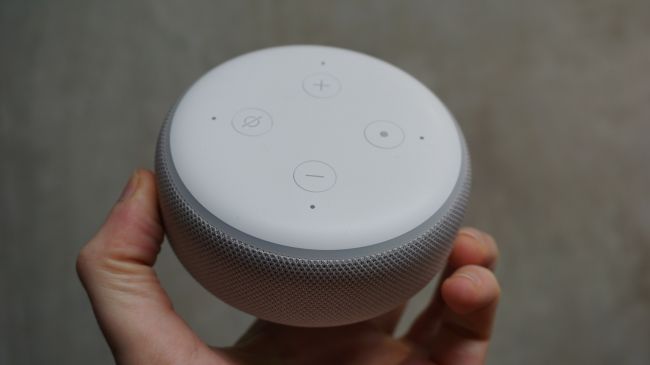Amazon Alexa stores voice recordings for as long as it likes (and shares them too)
A letter from Amazon reveals all

Sign up for breaking news, reviews, opinion, top tech deals, and more.
You are now subscribed
Your newsletter sign-up was successful
Back in April, it emerged that Amazon employees could be listening to recordings of Amazon Echo speaker users' conversations with Alexa – and now, it's been revealed that those recordings can be kept indefinitely by the company and, in some cases, are being shared with third-parties.
This has come to light after US Senator Chris Coons sent a letter to Amazon asking "how long it kept voice recordings and transcripts, as well as what the data gets used for", according to Cnet.
- Amazon Echo vs Amazon Echo Dot: which is best for you?
- Check out our first impressions of the Amazon Echo Show 5
- Read our Amazon Echo Plus review
In his response, Amazon's vice president of public policy Brian Huseman revealed that the company keeps voice recordings and transcripts from Alexa interactions indefinitely, only removing them when "the customer chooses to delete them".
You can delete them, except...
Customers can "review, listen to, and delete voice recordings associated with their account using the Voice History feature available in the Alexa app and the Alexa Privacy Hub", according to Amazon's response letter.
However, there are recordings Amazon won't delete at all, even if users remove the audio using this feature. These include requests involving a transaction like "ordering a pizza or hailing a ride share" – the Alexa skill's developers, which can be third-party companies like Dominoes or Uber, can keep a record of that transaction.
As Cnet points out, that means there's a record of "nearly every purchase you make on Amazon's Alexa".
Huseman's letter also noted that other types of Alexa requests like setting a recurring alarm are also retained. He justified this by explaining that "customers would not want or expect deletion of the voice recording to delete the underlying data or prevent Alexa from performing the requested task".
Sign up for breaking news, reviews, opinion, top tech deals, and more.

The price of privacy
In response to the Coons' question about the purpose of retaining transcripts of voice recordings, Huseman writes that "machine learning systems need to be trained using real world data".
"Training Alexa with voice recordings and transcripts from a diverse range of customers helps ensure Alexa works well for everyone", he says.
For his part, Coons is unimpressed by Amazon's response to his concerns.
In a statement, the Senator said: "Amazon's response leaves open the possibility that transcripts of user voice interactions with Alexa are not deleted from all of Amazon's servers, even after a user has deleted a recording of his or her voice".
"What's more, the extent to which this data is shared with third parties, and how those third parties use and control that information, is still unclear."
Should that put you off buying an Amazon Echo speaker like the Echo Dot, or a smart display like the Echo Show? It's hard to say, and largely depends on how privacy-conscious you are.
If previous claims of Amazon employees listening to recordings to train Alexa haven't bothered you so far, then chances are the knowledge that some of your transaction history is being stored won't either.
Plus, Echo speakers could be about to get a hefty discount with Amazon Prime Day 2020 on the way – the price you put on your privacy is down to you.

Olivia was previously TechRadar's Senior Editor - Home Entertainment, covering everything from headphones to TVs. Based in London, she's a popular music graduate who worked in the music industry before finding her calling in journalism. She's previously been interviewed on BBC Radio 5 Live on the subject of multi-room audio, chaired panel discussions on diversity in music festival lineups, and her bylines include T3, Stereoboard, What to Watch, Top Ten Reviews, Creative Bloq, and Croco Magazine. Olivia now has a career in PR.